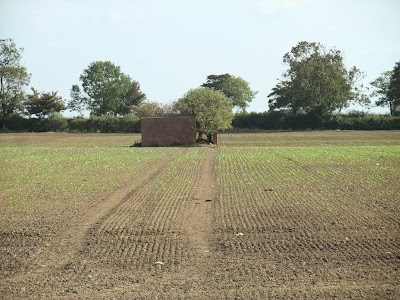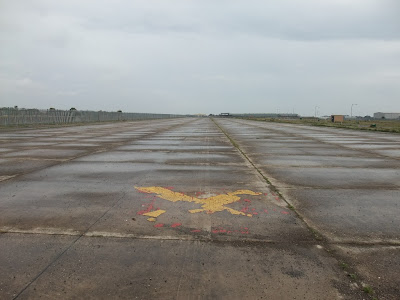On my recent trips upto Yorkshire, Carnaby Airfield was one site I visited. Some more posts from Yorkshire to follow as well as some posts on the Corps Line in Suffolk.
Work on constructing Carnaby aerodrome was started in the early years of the War. It was opened in 1944- the following text is from www.airfields-in-yorkshire.co.uk:
Work on constructing Carnaby aerodrome was started in the early years of the War. It was opened in 1944- the following text is from www.airfields-in-yorkshire.co.uk:
" Carnaby opened in March 1944 as an emergency landing ground for Bomber Command to enable crippled bombers a safe place to land near the coast.
Carnaby Moor, near Bridlington was ideal. A single runway almost 2 miles long and over 700ft wide was constructed. The airfield had to be available in any weather and as well as an anti skid bitumen surface for the runway, FIDO (Fog Investigation Dispersal Operation), a device of petrol burners used to burn off fog, was installed. The system used lighted petrol to lift the fog from the airfield thus enabling aircraft to land safely.
Carnaby's wartime service was short but in it's operational life over 1400 emergency landings were recorded.
The base closed in March 1946 and was left to the elements until the outbreak of the Korean War, where the RAF increased its pilot training programme and Carnaby opened again in 1953 becoming a relief landing ground for Driffield.
Again, life to Carnaby was short lived and the base closed in 1954.
It wasn't until 1958 that Carnaby became operational again, this time deemed as a Thor missile site. 150 squadron was reformed and designated the Thor unit.
1963 saw the base close for the last time and the site was left to decay. In 1972 the site was brought by Bridlington Council and was turned into an industrial estate, as it is today. The main runway is now the road through the estate, the only real clue to its existence as an airfield. Very little remains today but you can still see parts of the taxiways. "
Above: Carnaby Industrial Estate on the site of Carnaby Airfield.
FIDO consisted of injecting petrol through pressurised pipes either side of the runway, which was then fired by burners set at certain intervals along the pipeline. It was estimated that visibility could be increased by 200 to 2,000 feet. Only three emergency airfields were constructed during the War, all equipped with FIDO (Woodbridge in Suffolk was also an emergency runway). FIDO was also installed at 12 other airfields which included Tuddenham in Suffolk.
FIDO was utilised on several occasions at Carnaby, which resulted in rumours in local villages that the runways had caught fire! During Dec 1944 about 100 American Fortresses landed and parked up in a double row alongside the airfield, unable to land at their East Anglian airfields due to fog. They all took off safely the following day.
Above: Artists impression of FIDO in operation
My mother remembers seeing missiles pointing out to sea while travelling to work on the train from Bridlington to Beverley. As Thor's were stored horizontally on transporter-erector trailers under cover of a retractable missile shelter I assume these must have been Bloodhound surface to air missiles sited to protect the Thor's - one major weakness of Thor was the launch sequence took 15 minutes making them vulnerable to attack before they could be launched.
Above: Thor ICBM (photographed at nearby Driffield) and Bloodhound SAM
On my visit I came across three remaining buildings although I don't know from which part of the airfields history they date from. Some standings/taxiways and remains of manholes/pipes in nearby fields can also be seen. Are the pipes/manholes the remains of FIDO??
Image 1 - 4: Remains of building, presumably a workshop.
Image 5 & 6: Remains of second building still surviving.
Image 7: Remains of the third building that can still be seen.
Image 8: Surviving standing / taxiway
Image 9 & 10: Pipes/ manholes in nearby fields - remains of FIDO?














The building in the first pictures was the generator plant and 9is the fido pipes and the manholes are just drainage. There are several of these near the thor missile site
ReplyDelete